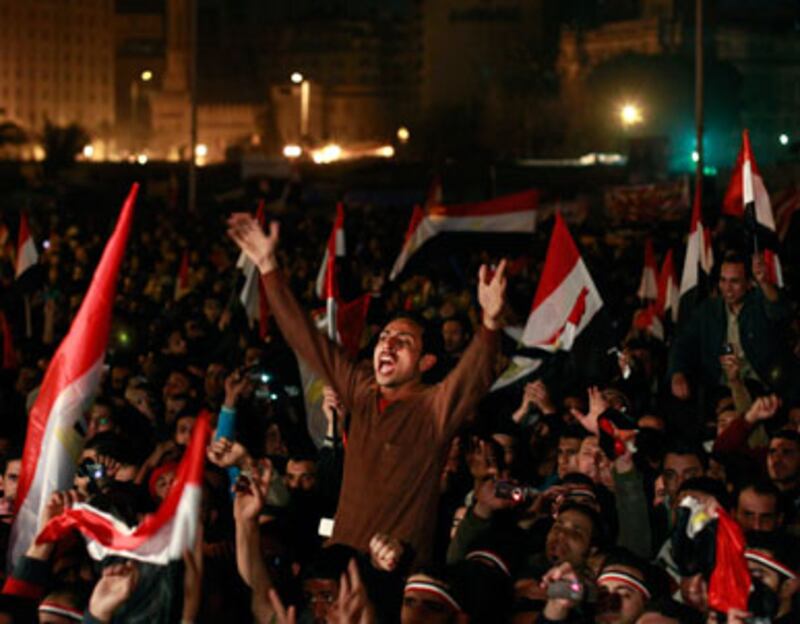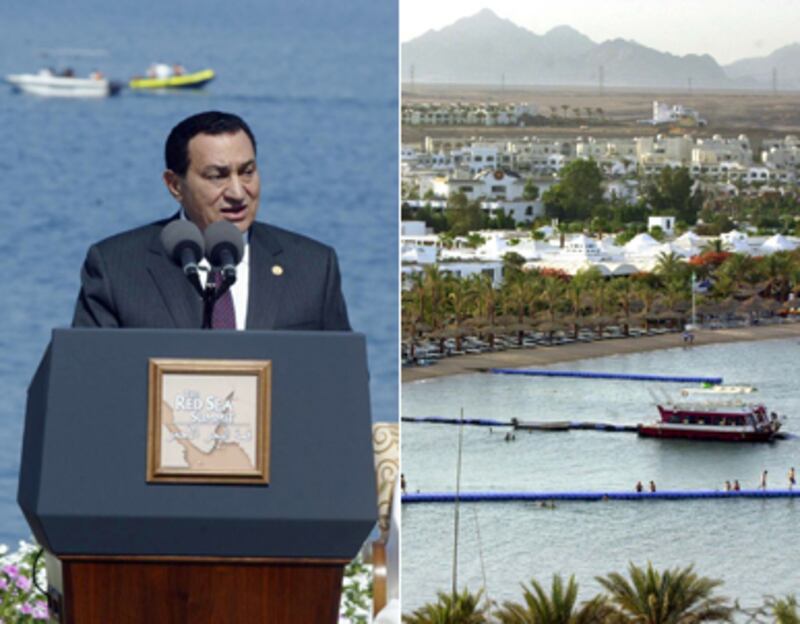A few thousand protesters continue to camp out in Cairo's Tahrir Square—and return every Friday—until the Mubarak-appointed government is abolished and the military council is decisive about transition plans.
See photos and videos below. Plus, full coverage of the Egypt revolution.
With President Mubarak officially ousted, a coalition of organizers behind Egypt’s historic 18-day demonstrations has drawn up their first cohesive list of demands for their new government, including the end of emergency law, the abolition of the current parliament, and a rewritten or entirely new constitution.
Egypt Supreme Military Council reiterated its promise to make the transition to a “democratic and free” Egypt, but said it would take its time, leaving Mubarak’s government in place as caretaker. Much to the chagrin of some of the protesters remaining in Tahrir Square, the council is supposedly being too opaque about its plans for transition.
To keep up pressure on the military now in charge, organizers have also called for renewed demonstrations to continue every Friday—though some say they will remain in Cairo's Tahrir Square until the military gives clear assurances it’s moving toward democracy. In a symbolic gesture of reconstruction, activists began cleaning up Tahrir Square, the heart of their rebellion. “We are cleaning the square now because it is ours,” said one 20-year-old student. A few thousand remain in the square, and scuffles broke out between them and the troops trying to dismantle their makeshift encampment.
The key question now is how the military will act in the transition. Egypt is now in the hands of two military leaders, both of whom earned credibility from the protesters by making appearances in Tahrir Square during the protests. But this doesn’t mean they’re pro-democracy; one, at least, Field Marshal Mohamed Hussein Tantawi, is seen as a determined opponent of political change. Tantawi was part of Mubarak’s ruling clique (WikiLeaks cables described him as Mubarak’s “poodle”). Less is known about the other officer, Lt. Gen. Sami Hafez Enan. In addition to moving toward civilian rule, the military has some big tasks in front of them: They must defuse demonstrations, quell labor unrest, rebuild the economy, and reconstruct security forces—while doing away with the emergency laws, as it promised.
Cairo's famed mueseum is in rough shape. Archaeologists taking stock of the famed museum are reporting that damage and looting were far worse than originally reported. Several valuable collectables are missing, including statues of historical icons like Tutankhamun and Nefertiti. At least 70 items were broken during the protests, according to Egypt’s minister of antiquities—who was promoted by Mubarak during the protests as part of a government shake-up intended to quell the uprising—and two skulls were taken from a research lab. The missing items, says British archaeologist Paul Barford, are “not just any old rubbish,” but extremely valuable artifacts.
Photos: Egypt Protests

Israel may be able to breathe a little easier: As U.S. military commander Adm. Mike Mullen heads off for a pep talk with Israeli Prime Minister Benjamin Netanyahu, the Egyptian army said in a statement Saturday that it "is committed to all regional and international obligations and treaties." Israel has been watching the Egyptian revolution with great concern, fearing that Mubarak's ouster would produce a new government hostile to the Jewish state and the landmark peace treaty the two countries signed in 1979. Egypt's military commanders also promised "a peaceful transition of power in the framework of a free and democratic system," though they have not yet established a timetable for creating the new democracy.
Meanwhile, Egypt has inspired other oppressed people to attempt reform movements. A budding protest movement in Algiers was put down Saturday by thousands of riot police, who hemmed in demonstrators and prevented them from completing a planned march. Estimates of the size of the protest vary: Organizers say 30,000 showed up and 1,000 have been arrested, while the AP says 10,000 are marching. The state news agency reports police have stopped the protest. Opposition leaders say they aren’t trying to overthrow President Abdelaziz Bouteflika, they just want reform. A sudden increase in food prices helped spark the protests a month ago, and demonstrators are chanting "$155 Billion, and We're Still Poor," a reference to the oil-rich country’s estimated foreign-exchange reserves. Last week, Algerian authorities promised to lift a state of emergency that’s been in effect since 1992.
Photos: Mubarak’s New Life in Sharm el-Sheikh

The top U.S. military official is touring the Middle East to reassure key American allies that everything will be all right. Adm. Mike Mullen will visit Jordan, which is facing its own unrest in the wake of revolutions in Tunisia and Egypt, and Israel, which is worried that the end of the Mubarak regime will lead to an Egyptian government less friendly to the Jewish state. Israel fought several bitter wars with Egypt before signing a peace treaty in 1979, an agreement that Mubarak steadfastly enforced. Israeli Prime Minister Benjamin Netanyahu has warned Egypt that its new government must continue to support the treaty, Israel's first with an Arab nation. The U.S. usually gives Egypt around $1.5 billion a year, mostly in military support, and the role of the Egyptian military in establishing a new order will make Mullen's connections in Cairo increasingly important for keeping the country on a peaceful path.





